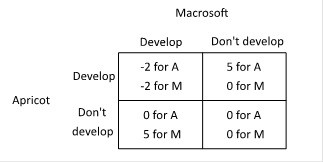Suppose two companies, Macrosoft and Apricot, and considering whether to develop a new product, a touch-screen t-shirt. The payoffs to each of developing a touch-screen t-shirt depend upon the actions of the other, as shown in the payoff matrix below (the payoffs are given in millions of dollars).  Suppose Apricot makes its decision first, and then Macrosoft makes its decision after seeing Apricot's choice. What will happen if, before Apricot chooses, Macrosoft announces that it is going to develop a touch-screen t-shirt no matter what Apricot does?
Suppose Apricot makes its decision first, and then Macrosoft makes its decision after seeing Apricot's choice. What will happen if, before Apricot chooses, Macrosoft announces that it is going to develop a touch-screen t-shirt no matter what Apricot does?
A. Neither Apricot nor Macrosoft will develop a touch-screen t-shirt because they will both realize that they are in a no-win situation.
B. Apricot will develop a touch-screen t-shirt, and Macrosoft will not because Macrosoft's threat is not credible.
C. Macrosoft will develop a touch-screen t-shirt, and Apricot will not because it's not in Apricot's interest to develop a touch-screen t-shirt if Macrosoft also develops one.
D. Both Apricot and Macrosoft will develop a touch-screen t-shirt because neither company will want to back down.
Answer: B
You might also like to view...
John Maynard Keynes believed that the equilibrium level of national income is primarily determined by aggregate expenditures
Indicate whether the statement is true or false
Agriculture's share of total output in the U.S. has declined throughout the 20th century, although the absolute value of farm output has increased. The number of U.S. farms grew in the early part of the century, then began to steadily fall. The number of U.S. farms peaked in which of the following decades?
a. 1910–1919 b. 1970–1979 c. 1930–1939 d. 1950–1959 e. 1980–1999